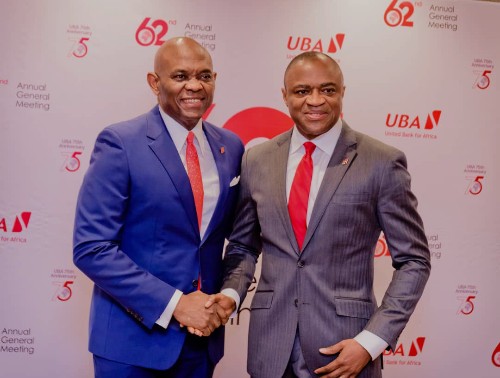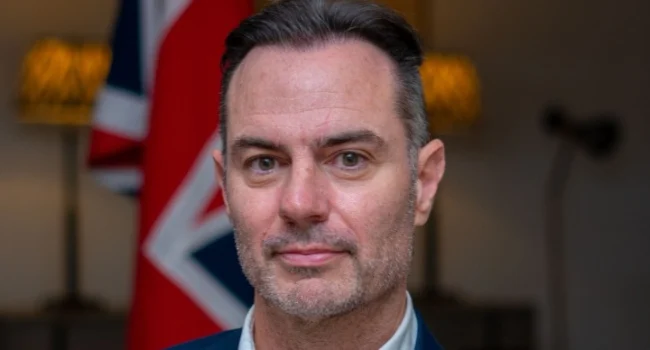The United Bank of Africa (UBA) has solidified its position as a leading financial institution, not just in Nigeria, but across the African continent and beyond.
With its tagline “One Brand, Global Influence,” the financial institution has continued to demonstrate a commitment to providing innovative financial solutions to individuals and businesses alike.
For 75 years, the Pan-African bank has transformed from a mustard seed to a thriving global powerhouse, creating a strong footprint in 24 Global locations while igniting success.
With a presence in 20 African countries and four global centres: London, New York, Paris, and Dubai, UBA has established itself as a truly global financial institution. Its expansive network ensures that it can meet the needs of its customers wherever they are, delivering world-class banking services with a local touch.
- Connecting Businesses in Africa
UBA is connecting people and businesses across Africa through retail, commercial, and corporate banking, innovative cross-border payments and remittances, trade finance, and ancillary banking services. The bank recognises the significance of micro, small and medium-scale enterprises (MSMEs) to the development of the African economy. Hence, it entered a $6 billion agreement with the African Continental Free Trade Agreement (AfCFTA) to show our commitment to the development of the MSMEs’ sector across the continent. Under this agreement, the bank provides businesses with the technical and financial solutions needed to succeed.
With this agreement, the bank promotes the development of MSMEs operating in four sectors under the first phase of the partnership which are largely import-dependent by providing technical and financing solutions for intra-African/domestic alternatives. These economic sectors are Agro-processing, Automotive, pharmaceuticals, Transport and Logistics.
One of the key initiatives of the AfCFTA is to improve access to finance and markets for MSMEs to encourage their growth and contribution to the socio-economic development of Africa.
UBA’s Group Managing Director, Oliver Alawuba, pointed out that the bank is focused on how to partner to move Africa forward particularly as it concerns MSMEs and women empowerment.
“We believe that African women can be more empowered to do more for African development and UBA is in the forefront of these initiatives. African trade is our key area of strength. Our presence in 20 African countries is mainly to drive inter-African trade.
“Our partnership with AfCFTA is also to drive inter-African trade. Inter-African trade is important. Africa needs to trade more with each other and that will further improve economic development across the continent
“I believe that this is the time for UBA, working with other corporate organisations and partners to develop the resources and opportunities that are available in the continent. We are today present in 20 African countries and four other countries outside Africa. Yes, Africa has tremendous opportunities. What we are saying is that we need to have partners, and institutions that will be able to harness these opportunities for the people. UBA is well-positioned to facilitate business within Africa and the rest of the world. That is why we are here in this conference,” he added.
Deputy Managing Director of UBA, Muyiwa Akinyemi, who signed the agreement on behalf of the bank, noted that being Africa’s global bank, UBA remains committed to supporting the growth/development of SMEs across Africa. This is in line with our strategic focus on the SME segment being a catalyst to the economic development of Africa.
Muyiwa further said, “ Under this partnership, UBA will go beyond just financing to provide non-financial services to these SMEs to develop the capacity for growth across the 20 African countries that we are present and build sustainable business practices. We shall also be leveraging technology to deliver our financing activities to the beneficiaries and this platform provides us with a unique opportunity to stimulate the development of the continent as Africa’s Global Bank.”
Also, UBA’s presence across four regions enables it to bring global expertise to local markets, driving economic growth and development. UBA’s business strategy is built on being the bank of choice for businesses across the African continent.
Using its extensive spread across the continent, it facilitates trade and also acts as the pivot for the inflow of investment capital. UBA provides corporate, commercial, SME, consumer, and personal (retail) banking services to more than 45 million customers, served through diverse channels: over 1,000 business offices and customer touch points with 2,669 ATMs, 87,223 PoS, and robust online banking services. Additionally, UBA offers pension custody and related services.
The bank has proven expertise and capacity in key sectors of economies across Africa, especially in oil and gas, infrastructure finance, agric, and commodity/export, and this positions the bank as a preferred partner for structured solutions to key governments and corporates operating in/into Africa. The Pan-African bank focuses on supporting people and businesses to succeed across Africa, Europe, Asia, and North America. Through its diverse range of financial products and services, it helps people fulfil their goals and enable businesses to prosper.
For UBA, serving customers is not just about profit as it strives to be with its customers every step of the way in their journey. Its overall strategic goal in its approach to business is defined by its strong desire to be the bank of choice for individuals and businesses across Africa and globally.
- Global Brand, Digital Expansion
The UBA brand is built on the foundation of three core values that guide everything we do; Enterprise, Excellence, and Execution. It fosters a culture of innovation and excellence, driving growth through strategic initiatives and exceptional service. By transforming ideas into actionable solutions, UBA consistently delivers high-quality results on time, setting the highest standards across all our endeavors.
Additionally, UBA’s extensive network of branches and ATMs across Africa has been instrumental in driving financial inclusion. By expanding its reach to underserved communities, the bank has empowered individuals and businesses to participate in the formal economy. This strategic expansion has also facilitated cross-border trade and investment, fostering economic growth and development.
UBA has been at the forefront of technological advancements in the banking industry. The bank’s digital platforms, including mobile banking and online banking, have made it easier for customers to access their accounts and conduct transactions. Additionally, UBA has introduced innovative products and services tailored to meet the specific needs of different customer segments.
- Corporate Social Responsibility
Beyond its core business, UBA has demonstrated a strong commitment to corporate social responsibility. The bank has undertaken various initiatives to support education, healthcare, and community development. By investing in the well-being of the communities it serves, UBA has reinforced its reputation as a responsible and ethical institution.
UBA has been experiencing a significant surge in its share price, primarily driven by the positive financial results it has consistently delivered. UBA shares closed on Thursday, September 19, 2024, at N24.65 per share, compared with the N16.80 per share it was as of September 20, 2023. Africa’s global bank is no doubt a growth and value stock combined making it the best bank to own for investors which would provide the necessary upside (Value) as well as the earnings (Growth) that would continue to underpin its stock price rise.
UBA’s growth has been accelerating in recent years as the vision of a pan-Africa lender begins to increasingly crystalise. This is driven largely by its financial performance which has continued to beat analysts’ expectations.
For instance, its audited financial results for the full year ended December 31, 2023, showed exceptional and impressive performance across all its major indicators. The bank recorded an impressive leap in gross earnings, as it grew from N853.2 billion recorded at the end of 2022 to close at N2.08 trillion; representing a strong 143 percent growth. The bank’s total assets also rose remarkably by 90.22 percent, doubling the N10 trillion mark to close at N20.65 trillion in December 2023; up from N10.86 trillion in 2022. This leap was a significant achievement and milestone in the history of the financial powerhouse.
Despite the highly challenging global economic and business environment, UBA in 2023, recorded a laudable profit before tax, with an exponential growth of 277 percent, to close the year under review at N758 billion, rising from N201 billion recorded at the end of the 2022 financial year; while profit after tax (PAT) grew by 257 percent from N170 billion in 2022, to N608 billion in the year under consideration.
Consequently, UBA Group Shareholders’ Funds rose from N922 billion as of December 2022 to close the 2023 financial year at N2.0tn, achieving an impressive growth of 120.2 percent compared to the prior year. Also, in the year under consideration, UBA Group’s cost-to-income ratio dropped from 59.2 percent in 2022, to 37.2 percent pointing to the Group’s improving efficiency.
In fulfillment of its promise to shareholders at its last Annual General Meeting, the bank offered a final dividend of N2.30 kobo for every ordinary share of 50 kobo, for the financial year ended December 31, 2023. Also worthy of note, UBA in the review year, recorded a 61.3 percent growth in loans to customers, moving up to N5.5 trillion in 2023, whilst customer deposits improved by 90.31 percent to N14.9 trillion, compared to N7.8 trillion recorded in the corresponding period of 2022, reflecting increased customer confidence, enhanced customer experience, successes from the ongoing business transformation programme and the deepening of its retail banking franchise.
The positive trend continued in the first quarter (Q1) of 2024. The UBA Group’s results as of March 31, 2024, showed outstanding year-on-year increases: Gross Earnings rose by 110 percent, from N271.1 billion to N570.2 billion; Interest Income grew by 130 percent, to N440.7 billion. Operating Income increased by 115 percent, from N175.7 billion in 2023 to N378.59 billion.
Further consolidating the record performance delivered in the Group’s 2023 full-year audited financials, UBA again saw profit before tax rising significantly by 155 percent from N61.7 billion in Q1 2023 to N156.34 billion in Q1 2024; while profit after tax jumped from N53.5 billion to N142.5 billion, representing an impressive rise of 165 percent year-on-year.
The bank’s impressive performance has attracted increased investor interest, boosting demand for its shares. These positive results showcase UBA’s strong financial health, robust growth prospects, and effective management strategies.
Key factors contributing to the stock price appreciation include the bank’s consistent increase in revenue and profitability, coupled with its expansion into new markets.
Group Chairman, UBA, Mr. Tony Elumelu, appealed to shareholders to participate fully and re-invest their dividends in the bank’s recapitalisation drive which is set to commence in the coming days, saying this would ensure that they continue to enjoy even higher returns from their investments.
He said, “I call on you shareholders to re-invest a substantial part of your dividends in our rights issues which will be announced soon, as we will be giving you the first opportunity to own a share in all the countries where we operate, I am advising shareholders, as you get your dividends, reinvest a significant part of it. As for my board members and I, we would be investing 100% of the dividends we get, because If we don’t do so, it means we would be leaving food on the table for others who did not labour for it,” Elumelu stated.
As the bank continues to deliver positive results and execute its strategic plans, it is expected to maintain its upward momentum and attract further investor interest. In conclusion, UBA has no doubt emerged as a powerful force in the global banking landscape. With its strong Pan-African footprint, innovative financial solutions, and commitment to corporate social responsibility, UBA is well-positioned to continue its growth and success in the years to come.

 BIG STORY5 days ago
BIG STORY5 days ago
 BIG STORY4 days ago
BIG STORY4 days ago
 BIG STORY4 days ago
BIG STORY4 days ago
 BIG STORY5 days ago
BIG STORY5 days ago
 BIG STORY3 days ago
BIG STORY3 days ago
 BIG STORY3 days ago
BIG STORY3 days ago
 BIG STORY5 days ago
BIG STORY5 days ago
 BIG STORY3 days ago
BIG STORY3 days ago
























